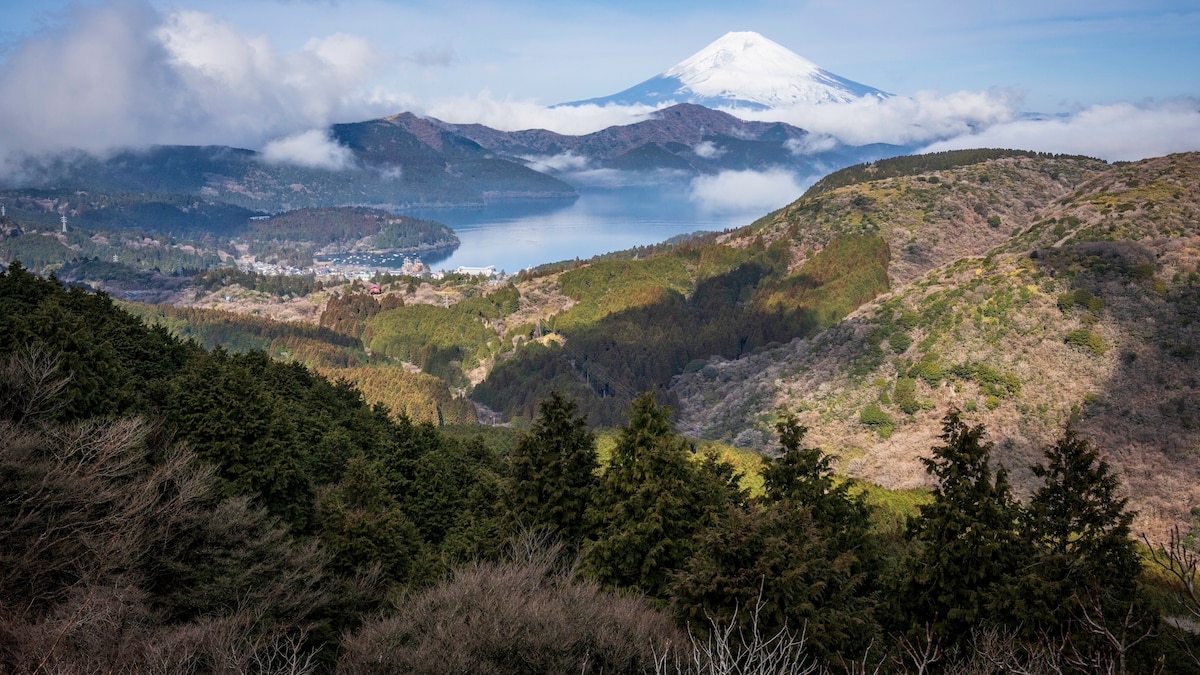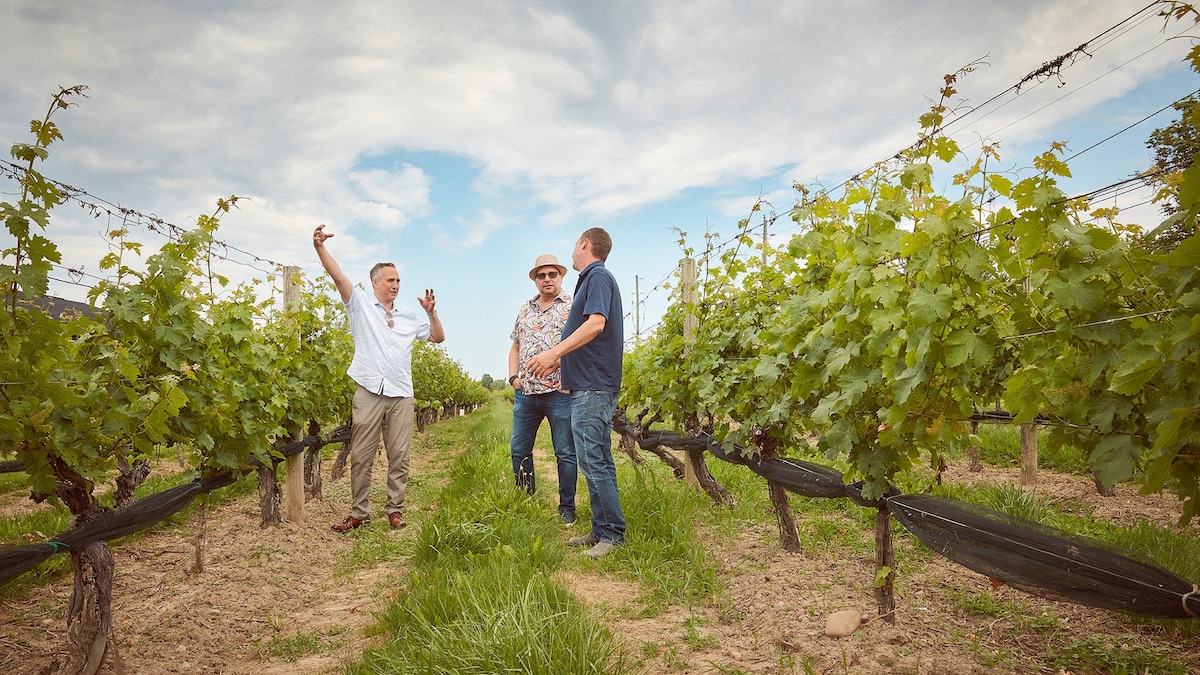Now Reading: Your next adventure: Unwind in Hakone, just outside Tokyo
-
01
Your next adventure: Unwind in Hakone, just outside Tokyo
Your next adventure: Unwind in Hakone, just outside Tokyo

Photographs byJonathan Irish
ByHeather Greenwood Davis
Tokyo’s vibrant metropolis is a must-visit on any trip to Japan—but just a short journey away is the town of Hakone, a serene escape where natural hot springs, mountain views, and tradition peacefully await. “Tokyo is really the center of everything,” says National Geographic photographer Jonathan Irish. “But Hakone is the opposite of that. It’s where people in Tokyo go to relax and recharge.”
Southwest of Tokyo and nestled in Kanagawa Prefecture—a regional jurisdiction somewhat similar to a state or province—Hakone offers a serene escape from city life. Known for its rejuvenating onsens (natural hot springs), historic teahouses, and breathtaking views of Mount Fuji, it has long been a favorite day-trip retreat for those seeking the traditional wellness remedies of the region. And, luckily, getting there is easy—whether by car (a scenic drive just over an hour) or by train (the speedy Romancecar from Shinjuku will whisk you there in under 90 minutes).
On his most recent trip, Irish grabbed his camera and shed his inhibitions for the ultimate wellness experience, discovering Hakone and a peaceful side of Japan where nature, culture, and healing all come together.
Connect with a cultural landmark
There’s a 12,389-foot reason to get to Hakone early in the morning: Arriving at Mount Fuji just before dawn offers a rare chance to see its summit emerge from the morning fog. For the best views of the famed landmark, Irish suggests heading for the Mount Taikan Observatory. To reach the observation point, you can either hike along designated trails—about five miles through serene, natural landscapes—or drive along Hakone’s winding, scenic mountain roads.

In Hakone, just beyond Tokyo, Mount Fuji rises in the distance, its snow-capped peak often cloaked in early-morning mist—reflected in the still waters of Lake Ashi below. On clear days, the view is utterly mesmerizing.

Perched at 1,011 meters, Mount Taikan Observatory is a favorite sunrise and sunset spot for locals and travelers alike—especially on clear, crisp mornings, when Mount Fuji appears in sharp relief against the horizon.
For Irish, seeing the iconic snow-capped peak of Mount Fuji—an image featured for centuries in Japanese art (often depicted in Edo-period woodblock prints), literature, and spiritual tradition—was a moment he’ll never forget.
“It was everything that I was hoping it would be—a perfectly shaped volcano. It emulates Japan in so many ways, just because of how perfect it is.”
Jonathan Irish, National Geographic Photographer
But even when the peak is obscured by mist and cloud, the surrounding landscape’s beauty allows for stunning photos. If you have the chance, do just as Irish did, and head down to Lake Ashi—a water-filled caldera formed about 3,000 years ago. It provides a stunning foreground for the rolling hills that surround Mount Fuji and Hakone, offering breathtaking photo opportunities all on its own.
Restore at a historic tea house
It’s not hard to imagine the 400-year-old Amasake Tea House (Amasake-chaya) as it once was. With its thatched roof, wood beams, and crackling fire from an irori (sunken hearth), it remains a cozy, warm, welcoming stop along the once bustling route between Tokyo (then Edo) and Kyoto. It is also one of the few surviving working teahouses on the route. For Irish, taking off his shoes and stepping inside the building along this ancient route was a chance to experience history.


Tucked along the historic Tokaido Road in Hakone, Amasake Tea House has been welcoming travelers for centuries with its thatched roof, warm hearth, and signature sweet rice drink. Step inside for a taste of tradition and a quiet moment of rest, just as weary wanderers have done since the Edo period.
“I was standing in a place where samurais walked and would stop to drink tea,” he says. “You can step into their world—see what they saw, feel what they felt—all in the same, unique setting. I thought that was really cool.”
The thing to taste now, as it was then, is a thick, fortifying, rice-based, healthy drink called amazake (amazake). Today, the 13th-generation tea house owners still make this naturally sweet, non-alcoholic, fermented rice refreshment using the original, historic, centuries-old recipe. “If you were walking this exact road 200 years ago in the dead of winter, you’d be pretty cold. So drinking something warm and filling wasn’t just for comfort—it was an absolute necessity,” notes Irish.

With a cup of warm amazake in hand and delicious chikara-mochi on your plate, you’ll feel transported—savoring centuries-old flavors in a setting steeped in history and charm. Earn 2X AAdvantage® miles at restaurants with the Citi® / AAdvantage® Platinum Select® card. Learn more here.
When you visit, be sure to also sample the delicious chikara-mochi—a traditional Japanese rice cake known for its chewy texture and subtle sweetness, that was once a popular snack for travelers on the old Tokaido Road.
Rejuvenate in a traditional onsen
The magic of the Fukuzumiro comes from both its historic architecture and the incredible natural setting. Founded in 1890, the building is registered as a cultural property of Japan. Surrounded by lush greenery, a simple soak here becomes a spirit-altering experience. Onsen, or traditional Japanese hot spring baths, are located near natural hot springs whose mineral-rich waters are believed to promote overall health and well-being. At Fukuzumiro, your soak in the geothermal waters is framed by large windows that open to the lush environment, filling the room with sunlight and the soothing sounds of the nearby river.



Fukuzumiro, a charming traditional inn and onsen nestled in Hakone, invites visitors to experience authentic Japanese hospitality surrounded by serene gardens and timeless architecture. For centuries, onsens have been treasured in Japan for their healing mineral waters, offering a restorative escape deeply rooted in cultural tradition.
Photograph by Jonathan Irish (Top) (Left)
“You could just basically sit there, read a book, and watch the river go by. It was effortlessly serene.”
Jonathan Irish, National Geographic Photographer
Each onsen has its own rules: Many require guests to bathe nude, some restrict entry to those with tattoos, and only a select few offer day passes. Here, you’ll find both indoor and outdoor baths, with options for private or public soaking—each thoughtfully integrated into their own unique domain.
If you fall in love with the peaceful location, traditional ryokan inns are available for overnight stays. Expect incredible Japanese hospitality, traditional tatami rooms, futon bedding, and kaiseki (traditional multi-course meals featuring local, seasonal ingredients).
Reconnect with your spiritual self
From your first deep breath (in through your nose; out through your mouth) at this Soto Zen Buddhist Temple, guests are invited to reframe their connection to self. The Zazen meditation practice (Zen meditation usually conducted in the lotus position) cultivates mindfulness, inner stillness, and connection to the present moment. At this historic temple, surrounded by towering trees and serene gardens, it’s an experience through which monks have been guiding people through since 1583.


Peace and reflection find a home at the Soto Zen Buddhist Temple, where simplicity and serenity invite visitors to slow down and experience mindfulness in a tranquil setting. Guides like Hiro-san (pictured) dedicate their days to meditation and teaching, embodying the temple’s spirit of calm and compassion.
Irish’s guide, Hiro-san, took him through a 20-minute private meditation during his visit, but guests can expect to join a small group of like-minded people in the serene space, centering themselves and identifying peace from within. Post-meditation, guests are invited to try homemade plant-based sweets including a delicious apricot oat milk pudding, inviting sweetness within.
Respite done right
From tranquil hot springs to forested trails and serene views of Mount Fuji, Hakone offers a restorative escape rooted in nature and tradition. As Irish discovered, this peaceful retreat invites you to slow down, breathe deeply, and reconnect with oneself. Whether you’re soaking in an onsen, meditating in luxuriant spaces, or simply embracing the stillness of the landscape, Hakone offers the perfect counterbalance to Tokyo’s vibrant pace and a chance to return renewed—in mind, body, and soul.























